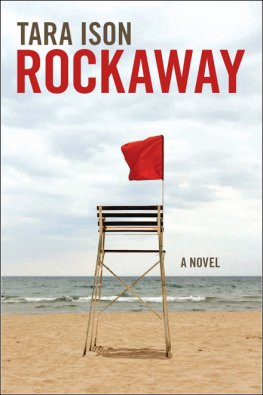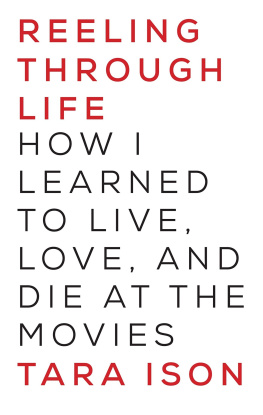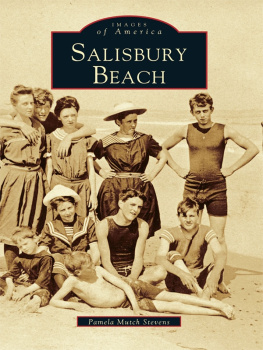THIS IS WHAT Ill paint, she decides: shells.
She is staying in a beach house at the last edge of asphalt before sand, a home that belongs to her best friends grandmother, who is away recovering from hip replacement surgery. She is here, emphatically, to paint. Back home in San Diego, a gallery owner, impressed by Sarahs art store display canvases daubed with rich Old Holland oils, had proposed an exhibit. If there were some interesting, recent work, perhaps. Paintings that expressed and defined who Sarah is, now. This was an important opportunity, she realized, something worthy of focus. But cant you paint here? her parents had asked. There are too many distractions here, friends, work, family, shed replied, hitting the fam hard, like in famine.
Youll be fine without me, she told them. I need to do this. I need to get away.
She called her best friend in Connecticut, whod married a millionaire and now had a country estate where they planted a garden for the pleasure of growing their own fennel and arugula. They raised sheep to knit their own lumpy, organic sweaters from. The cost of feeding and shearing the three sheep, and having their wool carded, came to over a thousand dollars a sweater. Sarah tried not to envy her friend these sweaters, but it was hard. Instead, she called the friend to request a haven.
Emily, about to have her third child by water birth, told her with kindness it wasnt a good time right now, and then generously offered her Nana Pearls house in Rockaway, New York. Right on the beach, Emily said, it would feel like home. It would be empty for three or four months during the convalescence, except for Bernadette and Avery, the caretaker couple who lived in a studio guesthouse. She could stay there the entire summer. No one would bother her. The perfect retreat. And,
Thisll be really great for you, Sarah, Emily enthused into the phone. Im so happy youre doing this, finally.
Sarah quit her longtime default job managing the upscale art supply store in La Jolla, California, a blandly beautiful seaside town outside of San Diego where she had grown up. For years shed shaved off ten percent of her paycheck and put it aside the way Mormons do to secure the earthly or heavenly future; she figured shed saved just enough money to live, for a while. She gave notice on the beige, formica-and-asbestos, meant-to-be-temporary apartment shed lived in since coming home from college, garage saled most of her kitchenware and furniture to San Diego State freshmen, and jammed the rest of her belongings, boxed-up and blanketed, into an 8 by 7 by 5 storage vault she rented for thirty-five dollars a month. She broke up with her shrugging, default boyfriend, David. She packed up palettes and fresh brushes and fat, unpunctured tubes of paint, solvents, primers, and siccative oils, set her email to an emphatic auto-reply (I am currently offline and unreachable, away on a painting retreat!), and instructed her parents not to call.
Of course we understand, they said, of course well be fine, dont be silly, this will be so wonderful for you, go, go!
The Rockaway house one of the oldest in the neighborhood, she remembers Emily telling her, 1902 or 03was surprisingly huge, dark gray stucco and fancy white trim, an awkward blend, she thought, of late-Victorian gothic and Cape Cod seashore glamour. The house, set off from the sea and sand by a low brick wall encircling the property, was at the dead end of a small flat street off Rockaway Beach Boulevard, at the western peninsula tip of Long Island, ten minutes of highway and one bridge across Jamaica Bay from Brooklyn. The houses longest stretch on the second floor spanned seven bedrooms and three bathrooms linked without hallways, all with ceiling-high windows facing the gray-green Atlantic and full of wave crash and sea-tanged air. Her friend Emilys mother Leah, plus Nana Pearls five other children, had grown up here; the house was peopled with photographs of these children, their children, and their children, including a recent shot of Emily with pregnant stomach and beatific smile, her husband and their two exquisite kids in their lumpy homeknit crewnecks. Dozens of eyes gazed on as Avery, the husband of the caretaker couple, guided Sarah upstairs, past walls collaged with grinny family photos.
And this is Aaron, and Michael, Leah, and Rose, he said, pointing. And this is Roses daughter Susan, and this is Frans son and his girlfriend, and
I know all these people, Sarah said politely. She and Emily had been best friends since third grade.
Ah, you are knowing Emily? This is Emily, with her husband and the children. .
They eventually arrived at the largest corner upstairs room, an oblong with huge picture windows on two sides framing the Atlantic Ocean like seascapes, gritty hardwood floors, threadbare rugs, and a queen-sized bed with a white iron headboard and flowered chenille spread. Waiting for Sarah was a large box shiny with packing tape, crammed full with the stretched and framed blank canvases shed UPSd ahead.
This is a good room for you, yes? Avery said in a booming, Sri Lankan lilt. He was a squat barrel-type man, ochre, tattooed, his bald head rooted solidly to his shoulders. This is Pearls room. So much sunshine. You can be looking out. It is good for you and your painting.
Its great. Really, thank you, Sarah said. She swung open one of the picture windows, breathed in the turquoise light, the inviting sweep of beach, the steady seashell hum. She couldnt remember when she last went swimming in the ocean, at home, but this ocean looked richer than the Pacific, more promising, as if undersea jewels and magical, tentacled creatures awaited. She graciously tried to tug her bags from him, which he had insisted on carrying for her.
And here are many rags for you, for the painting. But I am thinking, you will not be lonely here? He looked concerned.
Oh, no. Im here to work. Im getting ready for an exhibition. She smiled gaily at him, studied the room the easel, thatll go there, by that window, maybe clear off that nightstand, yes and began to unpack her palette knives from the small wooden case shed clutched to her side. I have an entire summer, she thought. Today is May 2nd. No, the 3rd. May 3rd, 2001. I have three months, maybe four. She envisioned filling her blank canvases with color, form, expression, and bringing them forth into the world, the rich smells of linseed oil and turpentine mingling with the ocean salt, infusing the house with her artistry, her presence. Im here for the working, she said, in response to his skeptical face. The being alone is good. Its perfect. Its what Im wanting. She hoped the gerunds would make it easier for him to understand.

IN HER FIRST moments on the empty beach A walk first thing will clear your head, she tells herself, freshen and focus your vision, maybe youll even go for a swim in that promising sea she spots a clamshell larger than shes ever seen, sticking up from the sand like a highway-divider flap. She brushes it free of grit and plans to hold onto it as a keepsake of this time, until she realizes the entire beach is mosaicked with these huge clamshells, like expensive, themed floor tiling. She switches her allegiance to oyster shells, which, though plentiful, are smaller and harder to spot in the sand. Every day after her morning toast and coffee, then again in the late afternoon before tea and fruit, she makes a ritual of striding the sand to gather one or two oyster shells hued in grays, only the rare, perfect, unbroken ones. They look like little spoons, she thinks. If you were trapped on a desert island, you could collect oyster shells to make yourself spoons. She pictures herself shipwrecked, blissfully, eternally alone, living on seafood and shredded coconut, painting with fresh-squeezed squid ink and wild berry juices. She brings the shells up to her room pausing to rinse them, and her bare feet, free of sand with the hose Avery leaves on the front porch and lays them out carefully on the dresser top shes cleared of Nanas prolific family photos; as the days pass it looks like dinner service for four, then six, then eight, then twelve, awaiting a houseful of convivial guests and a course of soup. She shreds open her UPS box, carefully props her canvases against the walls of her room, arranged so their creamy faces can gaze expectantly upon her.














